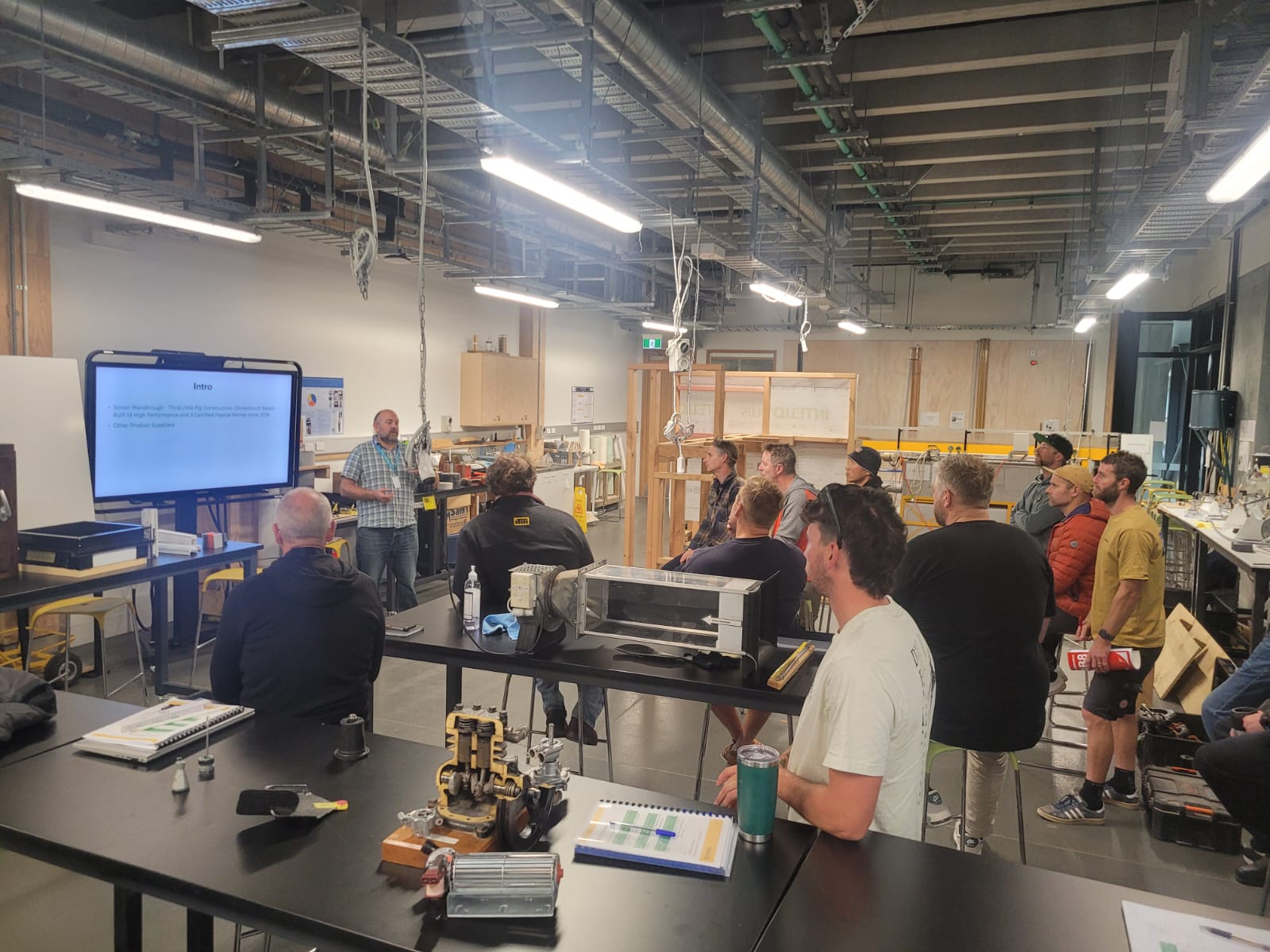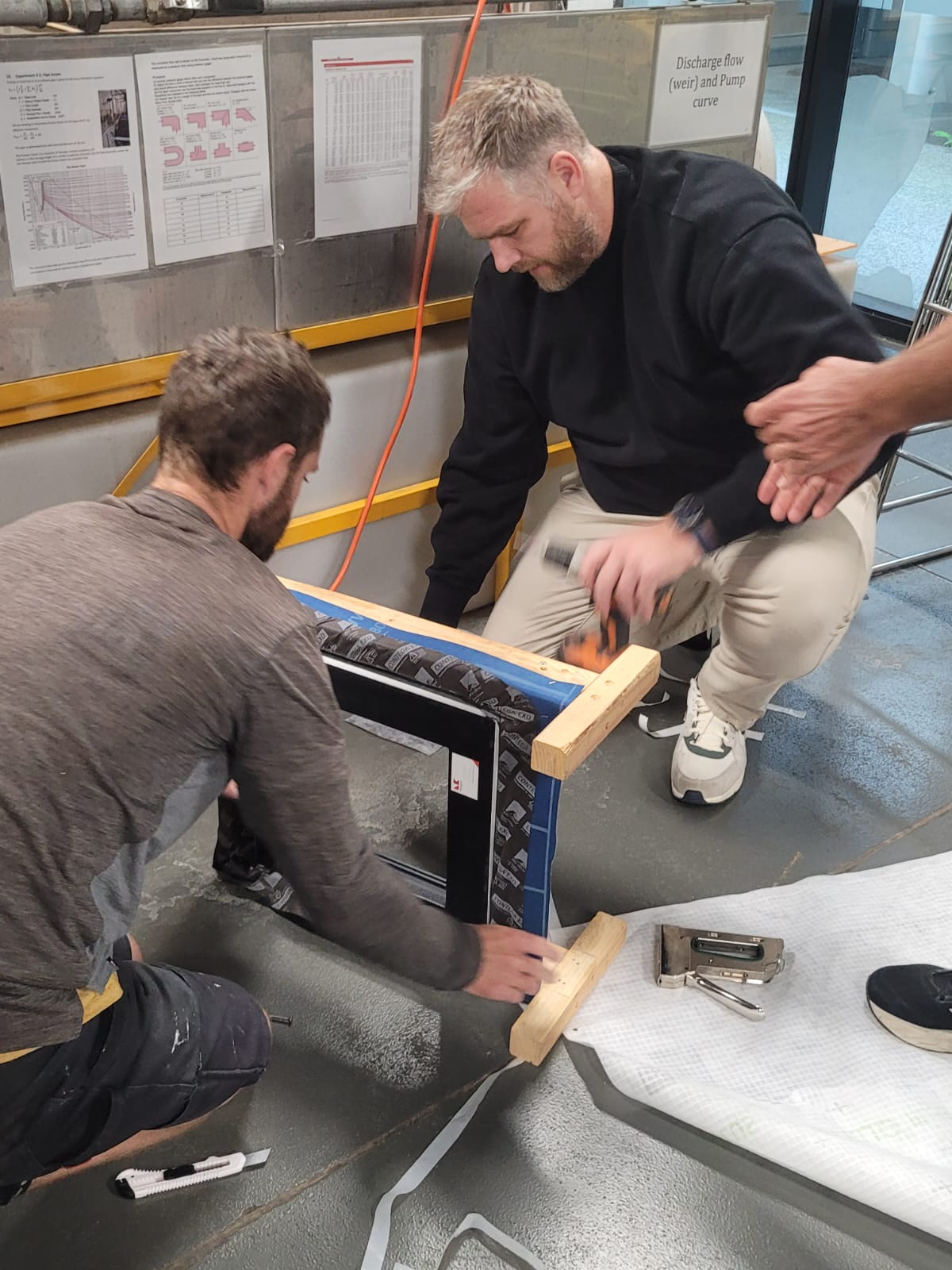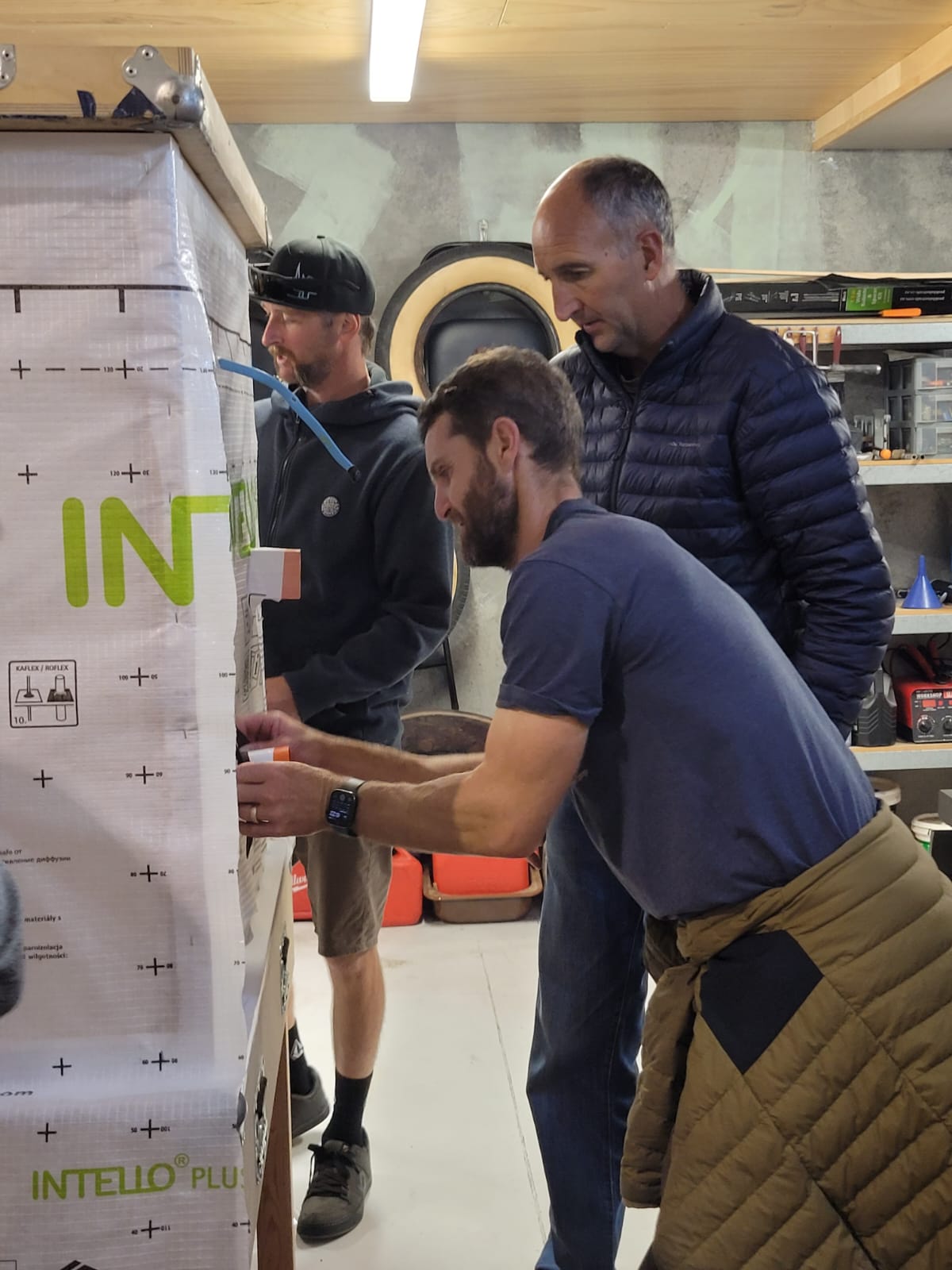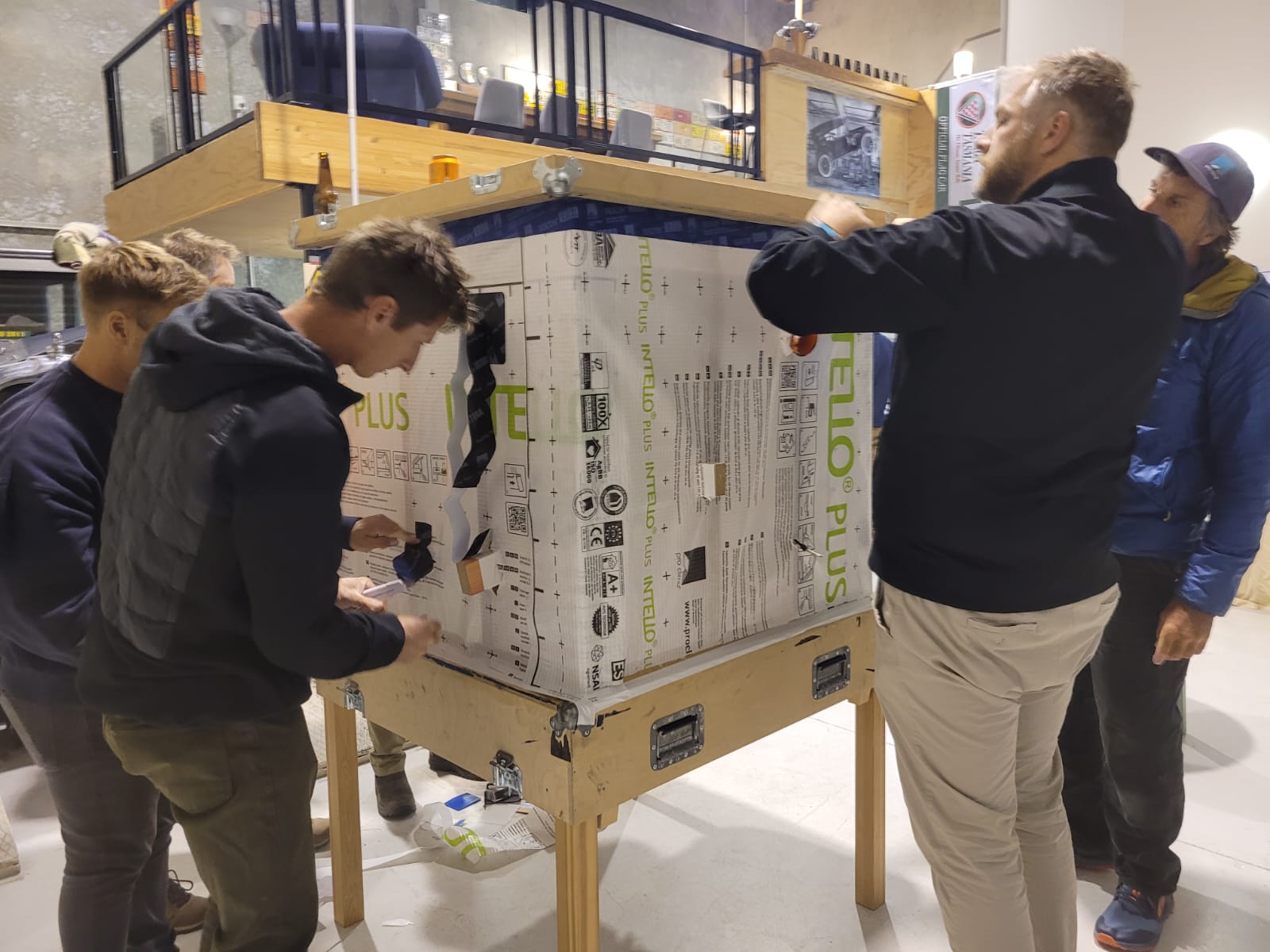Learning to build better: Ara tutors upskill in Passive House construction
07 July, 2025
Ara is embracing the Passive House standard, with tutors upskilling to bring world-leading building science into its training programmes.

What does the future of housing look like? If you ask the experts, it looks like Passive House - a world-leading standard for energy-efficient, healthy and comfortable homes.
Earlier this year Ara Institute of Canterbury hosted the internationally recognised Passive House Tradesperson Course, delivered by Sustainable Engineering Ltd. Led by experienced trainers Jessica Winter and Simon Wansbrough, the week-long programme brought together a roomful of builders, consultants, owners and industry professionals ready to deepen their understanding of building science and future-proof their practice.
Among them was Alesh Novotny, Ara construction tutor, who not only took part in the course but also sat the final exam alongside tradespeople from companies like Árbol Eco Homes, Smylie Builders, McBrimar Homes, Ethos Homes, Ecotectural Home Builders and LOC Construction.
Also in the room (and perhaps unfairly nailing the quiz questions with suspicious ease) was Damien McGill, Local Chapter Lead for the Passive House Institute New Zealand and Director of The Healthy Home Cooperation Limited. Already a qualified Passive House professional, Damien was there to observe what today’s builders are learning and support the next generation of low-energy housing advocates.
So, what is Passive House, exactly?
“It’s a building standard that’s energy-efficient, comfortable, cost-effective and environmentally friendly,” McGill explained. “A Passive House is so well insulated and airtight that it can often be heated just with the air coming in through the ventilation system - no need for a heater in every room. Ultimately, Passive House is all about comfort,” he said.
In other words, homes built to the Passive House standard are healthier, more efficient and cheaper to run. A win for people and the planet!
The course covered the theory and practical applications of the five Passive House Pillars: airtightness, insulation, thermal bridging, windows and ventilation, along with Passive House Planning Package (PHPP) calculations using real-world tools and materials. A highlight was the hands-on day, where tradies worked with tapes, membranes and mechanical ventilation systems, gaining skills many wished they’d learnt years earlier.
“Builders who complete this course know the why and the how,” said trainer Jessica Winter.
“They understand the science behind building performance, not just how to tape a window, but why airtightness and thermal bridging matter. These are the best builders in town, the ones you want building your home. It’s exciting to see so many tradespeople engaging with Passive House, because every builder we train is one more step towards better, healthier homes for Aotearoa,” she said.


By having a tutor complete the course, Ara is taking steps toward further embedding Passive House knowledge into its construction and carpentry training programmes. The insights gained will help shape future curriculum content and upskill the next generation of builders in sustainable, energy-efficient construction practices.
“It was great to be part of the course; not just for my professional development, but to see firsthand how we can embed this knowledge into our teaching,” said Alesh Novotny, construction tutor at Ara. “The course highlighted the importance of building science in practical construction. Our learners are the future of the industry and if we can give them a grounding in Passive House Pillars early on, we’re setting them up to build better from the start.”
While Passive House is not currently covered in detail in Ara’s carpentry courses, tutors are aware of the standards and share insights informally. Carpentry students typically build standard relocatable homes that meet the New Zealand Building Code, whereas Passive House specifications go well beyond these requirements.
In contrast, Ara’s Engineering and Architectural Studies (EAS) programmes have embedded Passive House standards into their curriculum for several years. The Environment courses (CONS5003 or BCEI500), core Level 5 courses, introduce students to Passive House concepts through group presentations and research projects. This helps students develop communication skills while deepening their understanding of sustainable building practices.
Passive House standards also inform other topics in the Environment courses, including sick building syndrome, passive solar gain, thermal design and energy use. These topics reinforce the importance of insulation, ventilation and energy efficiency in modern construction.

Students in the New Zealand Diploma in Construction (Quantity Surveying or Construction Management), Bachelor of Construction (Quantity Surveying or Construction Management) and Diploma in Architectural Technology all engage with Passive House standards. Architectural students learn how to incorporate these standards into design, improving performance and efficiency. Construction management students gain insights into quality control and coordination, crucial for Passive House builds. Quantity surveying students learn to price projects accurately, accounting for the higher standards and labour involved.
“Alesh’s involvement was more than professional development – it's a signal of where we’re heading,” says Robert de Roo, Head of Department – Engineering and Architectural Studies. “We’re committed to preparing our learners for a future where warm, dry, energy-efficient homes are the minimum expectation.”
“I am passionate about Passive House, construction and teaching,” Novotny added. “It’s my privilege to pass this knowledge to our next generation of construction professionals. One day, I hope to build a Passive House myself.”
As Novotny puts it: “If we can keep water hot in a thermos all day, why can’t we keep our houses warm? In Passive Houses, we can.”
If you're curious about Passive House and want to lay the foundation for your understanding, consider attending an upcoming event hosted by Passive House Institute New Zealand. It's a great way to start building your knowledge - brick by brick. The next event is on Wednesday, 16 July 2025, and a conference is running at Tūranga, Christchurch Central Library, at the end of the month.